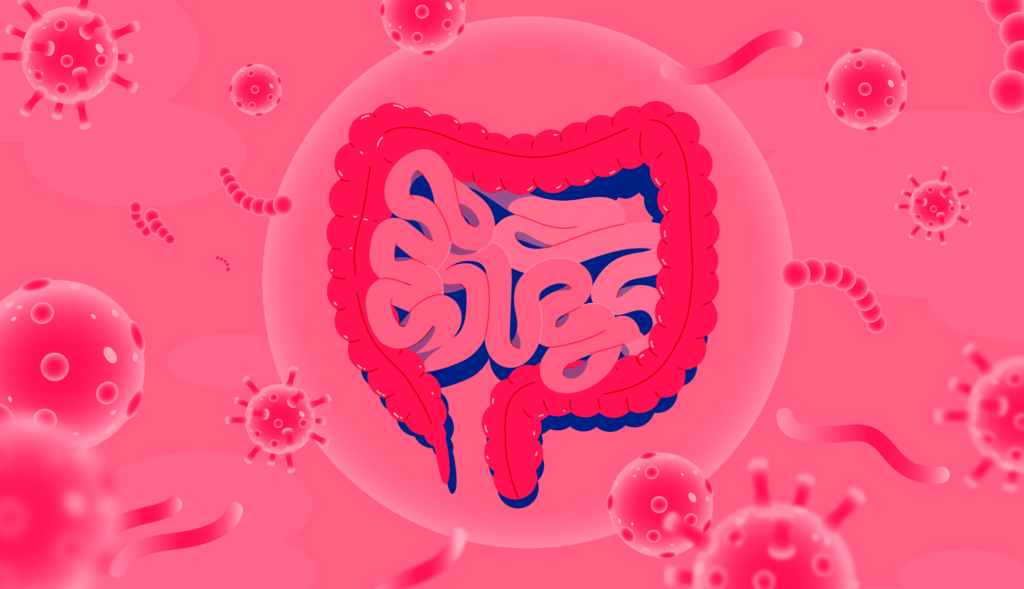What Are Short-Chain Fatty Acids And Why Should You Care?
Short-chain fatty acids are produced by beneficial bacteria in your microbiome and they’re essential for your gut, body, and even brain health.
Short-chain fatty acids (SCFA) can be made from all carbohydrates, but mainly from prebiotic dietary fibers that fuel the activities of beneficial bacteria. These organic compounds have many important roles in the gastrointestinal tract, and for your wider health.
Table of contents
- Acetate, the most abundant SCFA in your gut
- Butyrate and its many health properties
- Propionate, it’s got great potential
- Lactate isn’t technically a SCFA, but nearly
However, there are some circumstances where their production can be limited, particularly when we don’t consume enough whole plant foods like, in the Western diet. Therefore, the importance of fibre cannot be taken too lightly.
It’s found in whole plant foods and because it nourishes the good bacteria in your gut, it is known as a “prebiotic”. You can increase your own SCFA production by increasing your intake of these dietary fibres.
The short version
| SCFA | Main producer | Health benefits |
| Acetate | Bifidobacteria, Lactobacillus, Akkermansia muciniphila, Prevotella spp., Ruminococcus spp. | regulates pH of the gut; controls appetite; nourishes butyrate-producing bacteria; protects against pathogens |
| Butyrate | Faecalibacterium prausnitzii, Eubacterium rectale and Roseburia spp. | energy source for colon cells; helps prevent leaky gut, combats inflammation and cancer activity, protects the brain |
| Propionate | Bacteroidetes, Firmicutes, Lachnospiraceae | regulates appetite; combats inflammation; helps protect against cancer |
| Lactate | Lactic acid bacteria | nourishes butyrate-producing bacteria; regulates the immune system; combats opportunistic bacteria |
In this article, we will look at three short-chain fatty acids (and lactate), bacteria that produce them, and how they promote different aspects of our microbiome, as well as digestive, whole body, and mental health.
Acetate
Acetate helps to keep your gut environment stable and nourishes other beneficial bacteria species in your colon.
Acetate accounts for the highest percentage of SCFAs produced by your gut bacteria. Therefore, the production of these compounds is integral to our overall health and wellbeing. It also highlights how the commensal bacteria, who regard your gut as home, live in harmony.
Main producers
Acetate is produced largely by Bifidobacteria and Lactobacilli, but Akkermansia muciniphila, Prevotella spp., and Ruminococcus spp. make it too.
For example, when you eat fibre, it passes through your GI tract to your gut where bacteria, such as Bifidobacteria, turn it into acetate. This SCFA can then be used by members of the Firmicutes family to make another metabolite, butyrate, which is a vital source of energy for your gut cells.
But bacteria like Akkermansia muciniphila are not reliant on your fibre intake specifically. Instead, they love a good much on the mucins in your gut lining which they can then transform into acetate. Sounds pretty amazing, doesn’t it? All this is going on inside you and you had no idea!
Functions for the gut and body
Acetate is an important regulator in the pH of your gut. It helps to keep the environment stable. For example, it helps to keep the gut acidic enough for your beneficial microbes to thrive and survive, but deter the opportunistic ones from entering and sticking around.Research has shown that in infants who are breastfed or later fed with foods containing prebiotics, acetate inhibits the growth of many common pathogens (the ones which can make us unwell). The effect is also greater when the gut is more acidic too.
It also binds to receptors in the gut lining where it works to control appetite and regulate the storage of fat. These receptors have important roles in promoting the release of specific gut hormones, peptide YY and GLP-1, which regulate our appetite.
Receptors capture specific chemicals that induce a response in the body
When these hormones are released by cells in the small intestine, you no longer feel hungry. So, you are less inclined to snack and take on extra calories. Therefore, the acetate produced from the breakdown of fibre can even help protect you against unnecessary weight gain.
The acetate produced by bacteria, such as Bifidobacteria, helps to nourish the butyrate-producing microbes in your gut, supporting the diversity of your beneficial microbes. Therefore, this SCFA helps other species to thrive and survive, a behaviour called cross-feeding.
Butyrate
butyrate is important for the health of our digestive system and for disease prevention, including neurological conditions.
This SCFA is produced less than the others, but research shows that it’s vital for your health. It’s great for combating inflammation which is a growing problem nowadays because it damages the body and increases the risk of several chronic diseases.
In fact, increasing your intake of prebiotic dietary fibres is an easy way to increase butyrate production in your gut, and may just counteract gut dysbiosis (imbalances in your microbiome) that is linked to many diseases, digestive problems, and even brain health. Cool stuff, right?
Main producers
Members of the Firmicutes family are known for making this SCFA. The main producers of butyrate are anaerobic bacteria like Faecalibacterium prausnitzii, Eubacterium rectale, and Roseburia spp.*.
Anaerobic bacteria are types which survive in areas where no oxygen is present. Hence why, in humans, they are often found along the gastrointestinal tract, and why it was impossible to grow them in Petri dishes because they can’t survive in oxygen-rich environments.
Functions for the gut and body
Butyrate has many functions in both the gut and the body. One of its principal roles is a main energy source for the cells lining the gut called “colonocytes”. In fact, butyrate provides up to 90% of its total energy requirements.
These cells need this SCFA so they can carry out their important functions, especially preserving the integrity of the gut lining. Your gut lining is super important because it acts as a barrier between your intestinal environment and the rest of your body.
When the lining is working effectively, it allows beneficial things like vitamins and minerals to enter the bloodstream and make their way to various parts of the body that need them. At the same time, it stops opportunistic pathogens, toxins, and food components getting into your blood and making you ill.The barrier is made up of tight junction proteins which control the opening and closing of the lining. But if these junctions are unable to close, it can cause a phenomenon called leaky gut. But by having a greater abundance of butyrate producers, you will have an increased production of this SCFA which in turn means you’ll be protected from leaky gut.
Another great thing about this product of fibre breakdown is that it has antioxidant and anticancer properties. And it has a pretty cool way of doing it, too: it causes rogue cells to kill themselves and prevent cancer from developing.
But for you to experience the benefits of butyrate, there’s something you need to do: eat more fibre. A diet which is low in whole plant foods means you have less protection against a leaky gut and other diseases, including cancer.
Role in mental health
butyrate is a multifunctional molecule because it is not only beneficial for gut health, it’s great for the brain too. Eating a diet which is high in fibre is known to have positive effects for our memory, cognition, and nervous system.
butyrate works via the gut-brain axis, a two-way communication system between the two organs. It targets many of the same pathways associated with brain-related conditions and is thought to have many neuroprotective effects.
Therefore, if you eat a high fibre diet, you can boost the activity of butyrate-producing bacteria. This could help defend against neurodegenerative diseases like Alzheimer’s and Parkinson’s, but also mental health disorders and autism.

9 Health Benefits Of Butyrate For Your Body And Gut
Propionate
Although it’s less studied than other SCFAs, propionate has some distinct health benefits which show it shouldn’t be underestimated.
Like all the other SCFAs we’ve mentioned, propionate is another product of the bacterial breakdown of dietary fibre. It has many health benefits.
Main producers
Propionate forms when carbohydrates are broken down by bacteria, including those from the Bacteroidetes, Firmicutes, and Lachnospiraceae phyla. However, the main bacterial producers in your gut are Bacteroides eggerthii, Bacteroides fragilis, and Veillonella parvula.
Interestingly, there are two species of Lachnospiraceae which can produce either butyrate or propionate when they are fed on different substrates like glucose or lactate.
Functions for the gut and body
Propionate is a health-promoting SCFA which has cholesterol-lowering, reduced fat storage, anti-cancer, and anti-inflammatory properties. It’s a product of bacterial fermentation in your large intestine.
As more and more people worldwide are diagnosed with obesity, propionate is getting increasing attention for its potential role in suppressing appetite. Just like acetate, propionate also stimulates the release of the hormone’s peptide YY and GLP-1 which tell us when we feel satisfied after food.In one study, when participants were administered propionate, the levels of these appetite hormones reduced energy intake by 14% at a buffet meal. And, in another study, weight gain was reduced by almost a quarter in overweight adults over a 24-week period where the participants were supplemented with propionate.
SCFAs provide fuel for the body’s functions and other bacteria too
Propionate produced in your gut also has anti-inflammatory effects throughout the body. That means it can protect you from various diseases, including atherosclerosis, a condition where fatty plaques stick to your artery walls. If these are left undetected, they can cause blockages in the blood vessels, increasing the risk of heart attacks and strokes.
Just like butyrate , propionate is also believed to have a protective role against colon cancer. Although the latter is more successful because it provides energy to the cells lining the colon, propionate is still promising.
Studies have shown that it is also able to make cancerous cells commit suicide, in effect, preventing cancer from developing. Therefore, alongside butyrate , it is regarded as a potent SCFA. If you were a cancer cell, you probably wouldn’t want to mess with it!
Lactate
Lactate is not technically a short-chain fatty acid, but it’s produced by gut bacteria and makes valuable contributions to the health of your colon.
Like SCFAs, lactate is a microbial metabolite. In other words, some of the bacteria residing in your gut produce lactate alongside other SCFAs through the breakdown of carbs. It helps to promote the health of your gut, and the bacteria which produces it can protect you from the disease.
Main producers
The main producers of lactate are lactic acid bacteria or lactobacillus. Rather helpfully, the clue is in the name. Lactic acid bacteria have been used for centuries to ferment foods, a process that also preserves them.
Today, many foods are made with the help of Lactobacillus, and these bacteria are known for their ability to benefit our health. You’re probably familiar with the yoghurts, milk, cheese, and kefir products on the supermarket shelves.
Lactobacillus itself is an important member of your gut microbiome because it helps to protect you from harm. It even releases substances to prevent pathogens from setting up camp in your gut.
Functions for the gut and body
Just like acetate, lactate can also be used by certain bacterial species to produce butyrate. So, by keeping your Lactobacillus abundance up, it can increase the production of lactate. Ergo, you will be indirectly helping maintain the integrity of your gut lining, and even reduce inflammation by nourishing your butyrate-producers.
It also has beneficial roles in your immune system. For example, it can act as a mediator for both the production of both pro and anti-inflammatory cytokines. In the gut, lactate helps to reduce inflammation.It does this by lowering the amount of damage to the cells lining the gut, suppressing the release of pro-inflammatory substances like IL-6, and minimising the signs of inflammation itself. And to think this has only been discovered in recent years is pretty interesting.
Exercise is also known to increase the abundance of lactic acid bacteria. These microbes attach to the lining of the gut which is why they have important roles in intestinal immunity and exclusion of opportunistic pathogens.
Role in mental health
Your gut and brain are linked via millions of nerves and nerve cells which pass signals to-and-fro. Hence, your gut microbiome can have a major influence over your central nervous system and the signalling pathways in your brain.
Research shows that some bacteria responsible for producing lactate can improve brain function. They also contribute to less symptoms of depression. Increasing your intake of fibre can have many positive benefits for your mood and brain health.
Remember this
Short-chain fatty acids are the primary products of the breakdown of non-digestible carbohydrates by gut bacteria. Collectively, they are a major source of energy for colon cells, and we can increase the production of these health-promoting compounds by increasing our consumption of fibre.
Acetate, butyrate, and propionate are the main SCFAs produced through bacterial fermentation. However, lactate, although not officially a type of SCFA, it is a product of the carbohydrate breakdown by lactic acid bacteria, and it has numerous health benefits.
butyrate and propionate are especially regarded for their health-promoting benefits. For example, butyrateis well known for its anti-cancer properties, while propionate helps us to feel full after eating and lowers cholesterol.
The great thing is, it’s super easy to increase the production of these health-promoting metabolites. You just need to cram in the fibre. The Western diet is traditionally low in plant-based foods, and yet your body is crying out for them.
Instead, most of us choose convenience foods which have little nutritional value. But by ensuring we add dietary fibre to each meal, we will be nourishing our gut bacteria and they’ll love you for it. As a show of appreciation their number will grow and their production of SCFAs will increase.
☝️TIP☝️You can check your gut bacteria and butyrate synthesis potential with the Atlas Microbiome Test. Get 10% when you subscribe to blog updates.
- Bested, A, C et al., 2013. Intestinal Microbiota, Probiotics and Mental Health: From Metchnikoff to Modern Advances: Part III — Convergence Toward Clinical Trials. Gut Pathog: 5(4).
- Bourassa, M, W et al., 2016. Butyrate, Neuroepigenetics and the Gut Microbiome: Can a High Fiber Diet Improve Brain Health. Neuroscience Letters: 625, pp 56-63.
- Bourriaud, C et al., 2005. Lactate is Mainly Fermented to Butyrate by Human Intestinal Microflora but Inter-Individual Variation is Evident. Journal of Applied Microbiology: 99.
- Byrne, C, S et al., 2015. The Role of Short-Chain Fatty Acids in Appetite Regulation and Energy Homeostasis. Int J Obes, 39, pp 1331-1338.
- Frost, G et al., 2014. The Short-Chain Fatty Acid Acetate Reduces Appetite Via a Central Homeostatic Mechanism. Nature Communications
- Hosseini, E et al., 2011. Propionate as a Health-Promoting Microbial Metabolite in the Human Gut. Nutrition Reviews: 69, pp 245-258.
- Liu, H et al., 2018. Butyrate: A Double-Edged Sword for Health? American Society for Nutrition: pp 21-29.
- Oriach, C, S et al., 2016. Food For Thought: The Role of Nutrition in the Microbiota-Gut-Brain Axis. Clinical Nutrition Experimental: 6, pp 25-38.
- Reichardt, N et al., 2014. Phylogenetic Distribution of Three Pathways for Propionate Production Within the Human Gut Microbiota. The ISME Journal: 8, pp 1323-1335.
- van Limpt, C et al., 2004. 134 Effect of Colonic Short Chain Fatty Acids, Lactate and pH on the Growth of Common Gut Pathogens. Pediatric Research: 56.



